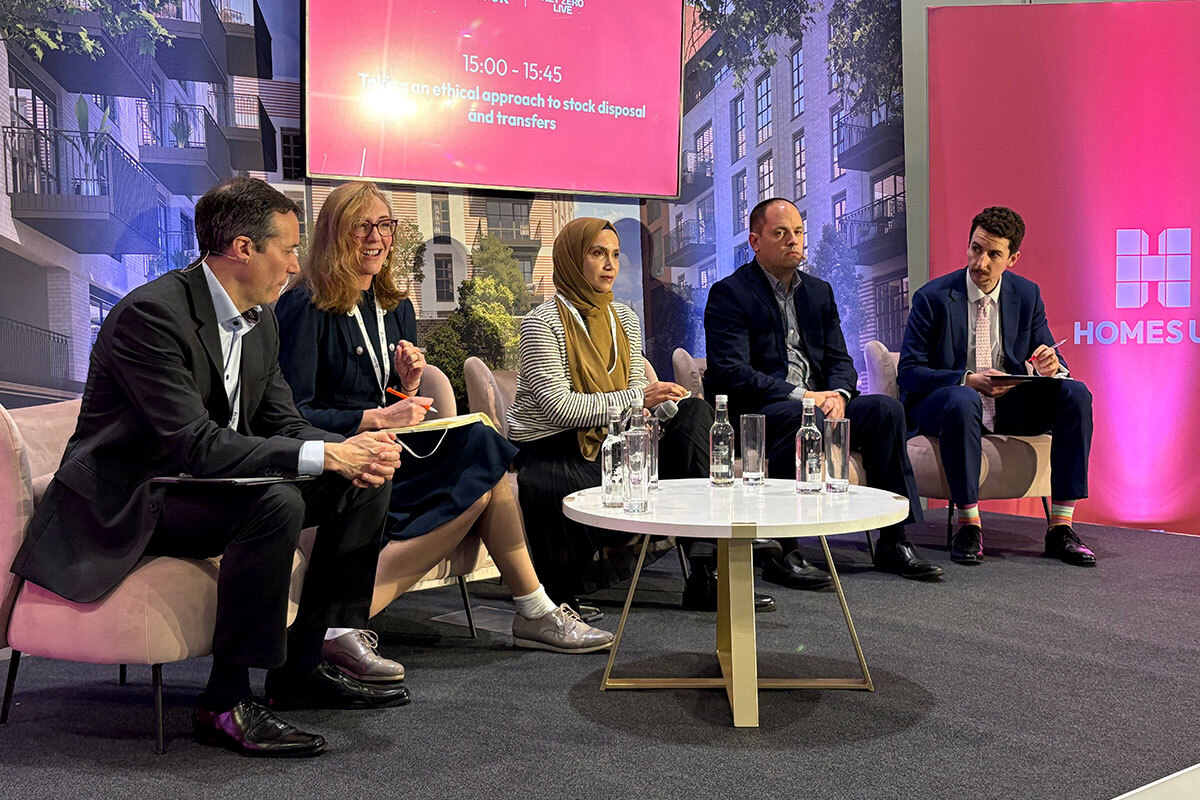Clarion selling homes only to landlords graded G1/V2
Clarion is selling homes only to social landlords with a minimum of G1 and V2 regulatory ratings, a senior executive has said.

Rob Lane, chief property officer at the 125,000-home group, told the HOMES UK conference yesterday (27 November) that there was significant appetite for tenanted portfolios from smaller housing associations that have paused building new homes.
Speaking at a panel discussion on ethical approaches to stock disposal and transfers, Mr Lane said: “We only sell to other registered providers. We only sell to registered providers with a G1/V2 at least.”
Grades for governance (G) and viability (V) are awarded to social landlords by the Regulator of Social Housing. A landlord with a G1, G2, V1 or V2 rating is deemed compliant under regulatory standards.
Mr Lane said that there was significant appetite for stock because “a lot of other housing associations aren’t building”.
“They have the balance sheet capacity, but they’re not building,” he said. “And therefore smaller local organisations do want to [benefit from] economies of scale.”
Clarion, which is the UK’s biggest housing association and was formed in 2016 through the merger of Affinity Sutton and Circle Housing Group, has around half of its stock in London.
Its predecessor organisations took on “a lot of Section 106” and ex-council homes, Mr Lane said.
He said that as part of its ‘Clarion 2040’ strategy, the group needed to rationalise stock around areas where it is most concentrated.
Mr Lane said Clarion has disposed of between 5,000 and 6,000 homes over the past eight years. This was “largely via stock transfer to local providers in those areas, allowing us to concentrate our portfolio”, he said.
Less than 0.1% of its disposals were void properties, ie homes without a tenant, and these void properties would be offered to a local authority first, he added.
Mr Lane was responding to a comment by fellow panellist Gemma De Brito, assistant director of homes and well-being at Nottingham Community Housing Association, who said her organisation mostly disposed of void properties rather than tenanted homes.
Ms De Brito said: “I find the tenanted transfers much more difficult, which is an interesting contrast to what Rob was saying.
“To comply with the consumer standards, you have to do meaningful consultation [with residents]… and any that feel that they’re moving away from a registered provider, in my experience, will strongly object, and say ‘you’re taking away my rights’.”
Explaining her association’s disposals strategy, she said: “We do some tenanted disposals, some void disposals, but mostly void disposals unlike Clarion.
“That tends to be in places that tick all the boxes: it’s difficult to retrofit, it’s in an area that isn’t our core area, and it’s a terraced house on a street.”
She added: “Where we have rural communities, vibrant communities around great schools and shops and places like that, we fight to keep those ones.”
Ms De Brito also asked the panel: “What kind of landlord do we want to be? I really struggle with this. On the one hand, housing is scarce. If you’re a social landlord, you should be providing the best kind of housing, because the people that you’re housing don’t have a choice.
“On the other side, if you’re flogging off your bad housing, someone’s buying it. Someone’s offering that housing to that community.”
In response, Mr Lane said that Clarion offloads “a mix” of homes at a time to buyers. “You might have some challenging properties in a portfolio… but also you’re getting a lot of other assets with it,” he added.
“As a large landlord, we have to work even harder at being seen as being local,” he said.
“In our stock transfers, what that means is that we engage with the community at a number of different stages, including selection of the landlord.”
Chris Hewitt, chief investment officer at for-profit provider L&G Affordable Homes, said his organisation was looking to buy tenanted portfolios of affordable rented properties.
“In terms of the tenanted acquisitions we’re looking to do, it would be more weighted towards rented than shared ownership,” he said.
“Affordable housing is a very popular investment space at the moment. There’s lots of investors looking at it, not just in terms of it being a tangible real asset but the social purpose that goes with that.”
L&G Affordable Homes recently recruited Catherine Raynsford from Hyde to lead on tenanted stock acquisitions.
Sign up for our asset management newsletter
Already have an account? Click here to manage your newsletters











